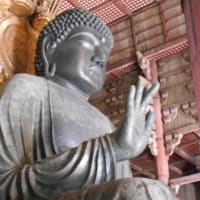
If a new democracy and new academic science emerge in this way, the current debate over constitutional revision alone may become meaningless *1 . It will be necessary to keep a close eye on developments in other countries *2 in this area .
*1 The current debate on constitutional revision will become meaningless.
Until now, discussions on constitutional revision have been aimed at increasing Japan's independence , but the relationship between the governing body and the people has changed from an indirect, conscious democracy to a direct, unconscious democracy. This is likely to become a central issue in constitutional revision. The idea of pacifism will probably be affected depending on which of these ideals of democracy one takes. The question of whether to adopt the idea of peace or to defend the large amount of overseas assets that have already been accumulated (which is closely related to the domestic financial situation), issues that are common even before the war, are also reflected in the filter of democracy. The answer will vary depending on the type .
*2 Movements in other countries
China is consciously trying to establish this kind of direct and unconscious approach under a powerful regime. However, since China is proceeding on the assumption that it will be ruled by the Communist Party, even if this new democracy becomes technically possible, there is naturally a risk that it will be used as a tool for authoritarian control. For these reasons, in the sense of decentralization, it is possible to consider the establishment of a new academic center that will compete with AI. The question is whether value lies in a single party that is biased, or whether value lies in the center of learning, but even if it is called the center of learning, under the current situation, imperfections remain. Alternatively, it may be expected that the current indirect democratic system will remain in some parts. The three powers are divided, and the separation of powers becomes four and five powers.
The aging population and declining birthrate will inevitably appear as a state of transition in the Japanese economy, as all men and women of all ages enter the labor force *1. If the supply capacity resulting from the labor force cannot keep up with the increase in medical expenses, the fiscal deficit will continue to increase due to the increase in welfare and medical expenses . Although the former can be covered by ``work style reform'' and the latter by a quasi-market system* 2 , ``public burdens'' will inevitably increase. Public burdens also redistribute income and can increase domestic demand and maintain economic growth, but public burdens that flow toward medical expenses may not lead to increased domestic demand.
*1 Employing all men and women of all ages into the labor force
The declining birthrate and aging population will reduce the labor force participation rate for some time. In order to overcome this situation, the introduction of robots and immigration may be considered, but from now on, it will probably be time for a ``society in which all citizens are dynamically engaged'' to include all men and women of all ages in the labor force. This is due to the timing of when pension payments begin, but there is a risk that introducing immigrants too easily will leave behind social problems. In fact, it is hoped that Japan will attract talented people from other countries, and Japan is currently looking for such an attraction. One way to make Japan more attractive would be to take advantage of the fact that the United Nations University headquarters is located in Tokyo and build a center of world policy scholarship in Japan, centered on the United Nations University.
Even with the introduction of robots and the cooperation of immigrants, it will be impossible to bring all Japanese people, young and old, into the labor force. The ideal would be to keep the economy running in a way that does not delay the start of pension payments as Japan recovers from the declining birthrate.
*2 Quasi-market system
In an aging society with a declining birthrate, medical insurance and long-term care insurance will probably become financially strained. This is because it is highly dependent on the labor force participation rate. These insurance systems are industries in which markets have been artificially created through insurance premiums and public burdens. If the burden of insurance premiums is insufficient, it will be supported by public burden, but in the case of Japan, in a macro sense, this means collecting taxes (and government bonds) from the private sector that has overseas assets. It's here. However, if overseas assets are lost due to foreign influence, it will no longer be possible to do so, so it may be inevitable that Japan will eventually increase its military power (even if it focuses mainly on security relations through diplomacy). Considering this, it is important that some industry (especially manufacturing) remains in the country, and a weaker yen may be more ideal than a strong yen. This is because the quasi-market system that supports medical and long-term care insurance is based on a substantive market system. Each of these constitutes a part of the economy, but there should be a concept of a more fundamental economic base.
all rights reserved to M Ariake

























※コメント投稿者のブログIDはブログ作成者のみに通知されます